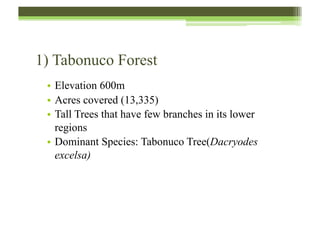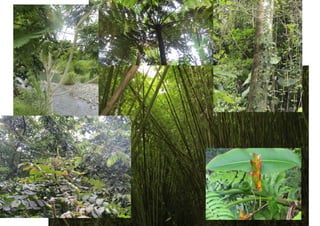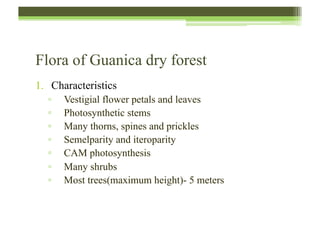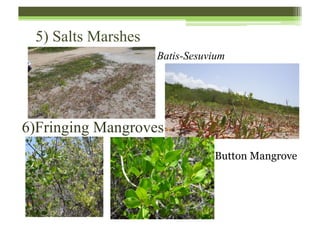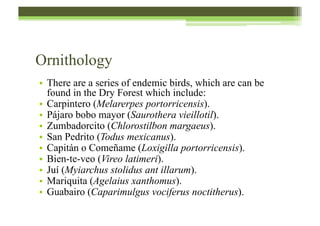El yunque vs. guanica dry forest
- 1. El Yunque vs. Guanica dry forest Mónica C. del Moral Jaslin Isern Hernán Méndez Fernando Pacheco Danilo Pérez Verónica Torres
- 2. El Yunque El Yunque Natural Rainforest has become one of the world’s greatest natural wonders due to the ecological diversity that distinguishes it. Its captivating beauty has attracted so much attention that it has even been considered a candidate in becoming one of the new Seven Natural Wonders of the World. But how did this forest become the biological jewel it is today?
- 3. • From the very origins of our civilization, El Yunque has been of major importance in different aspects. • It is believed that the Taíno Indians would worship Yuquiyú, the god of good, from the peaks of this singular highland. They called this mountain Yuque, meaning sacred or white lands, since their peaks were covered with clouds (the Spanish later mistook the name and called it Yunque). • Its unique beauty attracted the Spanish and in 1876 King Alfonso XII designated 12,000 acres of the Sierra de Luquillo as a reserve, making El Yunque one of the oldest reserves in the Western Hemisphere.
- 4. • In 1898, the Spanish-American War Spanish Crown ceded Puerto Rico to the United States. Five years later, United States’ President, Theodore Roosevelt, proclaimed the forest the ‘Luquillo Forest Reserve’. • The name was once again changed under the management of the Forest Service Division of the United States Department of Agriculture (USDA) to the ‘Caribbean National Forest/Luquillo Experimental Forest’. • In 1976, the United Nations Education Scientific and Cultural Organization (UNESCO) proclaimed it the first International Biosphere Reserve in Puerto Rico, under the program ‘El Hombre y la Biosfera’.
- 5. Guanica With population growth and the need for land, forests have been threatened worldwide, many of which have been altered by man. Fortunately Guánica Dry Forest, classified as a xerophyte subtropical forest, is one of the best preserved dry forests in existence.
- 6. • Originally, the forest was a private property in which farming took place. • In 1919 it was established as the ‘Guánica State Forest’. Because of its importance, it was later designated as a Forest Reserve in 1985. • Due to its complexity of natural and scientific importance, in 1981, the United Nations Organization (UN), under the program of the United Nations Educational, Scientific and Cultural Organization (UNESCO) it was awarded the distinction of being the second International Biosphere Reserve in Puerto Rico.
- 7. • This forest has given great importance to scientific research, vital information to develop a management plan aimed at forest conservation. • Currently, Mr. Miguel Canals of the Department of Natural and Environmental Resources (DNER), directs the forest and has participated in many of the scientific research that has occurred there. • A compilation of some of the research done until 1990 was published in the journal ‘Acta Scientifica’. From 1990 onwards 119 investigations have been conducted in a variety of fields, such as flora and fauna, archeology, ecology, and fishery, among others.
- 8. El Yunque localization • It is located in the north-east region of Puerto Rico in the Sierra de Luquillo. • El Yunque takes certain areas of Canóvanas, Río Grande, Luquillo, Las Piedras, Naguabo and Fajardo. • It is around 11,500 hectares of terrain
- 9. Guanica dry Forest localization • The Dry forest of Guanica is located at the south- west of Puerto Rico. • It is in the Coast of Gúanica. • It is approximately 11,000 cords of terrain including 8 nautical miles.
- 10. Climate El Yunque • It is very moist all year • A lot of breeze • The temperature is 77.9°F in the low regions of the forest; in the high regions of the forest it may decrease up to 65°F. Dry forest of Guánica • Very dry • Hardly any precipitation • Temperature reaches the 75°C during the rainy months(August- November) and 95°F during the dry months(December-April)
- 11. Precipitation El Yunque • Annually there are 1,625 rainfalls • Average of rain is 97 inches in the low regions and in the high regions is 185 inches • Months of mayor rain: September and October • Minor rain: February and March Dry Forest of Guánica • Does not rain often • The average amount of rain per year 25-30 inches • A lot of evaporation • It has a lot of marine influences : humidity and salinity
- 12. Soil El Yunque • Extensive • Moist yet useless • Low in nutrients • Not fertile • It is elevated terrain • Not very deep Dry Forest of Guánica • Limiting • Dry and useless • Low accumulation of organic components • Not fertile • It is mostly plane terrain • It is mostly rocks and stones
- 13. Rivers(water) El Yunque • Has 8 mayor rivers: Espiritu Santo, Mameyes, Sabana, Pitanaya, Fajardo, Santiago, Río Blanco and Río Grande de Loíza And many innumerable ravines and streams Dry Forest of Guánica • Lack of permanent rivers
- 14. Flora of El Yunque • 240 native species • 26 endemic species • 47 exotic species • 50 native orchids • 150 Ferns
- 15. Yunque divided in four zones • Tabonuco Forest • Palo Colorado Forest • Palma Sierra Forest • Enano Forest or Cloud Forest
- 16. 1) Tabonuco Forest • Elevation 600m • Acres covered (13,335) • Tall Trees that have few branches in its lower regions • Dominant Species: Tabonuco Tree(Dacryodes excelsa)
- 17. Other species • Arboreal Ferns(Cyathea arborea) • The Guaraguao tree(Guarea guidona) • Laurel Sabio (Magnolia splendens) • Ausubo(Manilkara bidentata) • Yagrumo Hembra(Cecropia peltata)
- 20. 2) Palo Colorado Forest • 600m-900m Elevation • Acre Extension(8,490) • Trees with hollow trunks and Superficial roots • Dominant species: Palo Colorado(Cyrilla racemiflora)
- 21. Other Species • Caimillito(Micropholis garcinifolia) • Caimillito Verde(Micropholis garciniaefolia) • Yagrumo (Cecropia peltata) • Azafran(Hedyosmum arborencens)
- 23. 3) Palma Sierra Forest • Elevation 600m • Acre Extension (5,088) • Palms have stabilizer root systems • Dominant species:Palma Sierra(Prestoea montana)
- 25. 4) Dwarf Forest (Cloud Forest)• Elevation 1000m • Acre extension (933) • Low elevation trees no more than 12 feet tall. • Dominant species: • Nemoca(Ocotea spathulata) • Roble Sierra(Tabebuia rigida) • Camasey Negro(Calycogonium squamulosum) • Guayabota(Eugenia borinquensis)
- 27. Other species • Moss • Bromelias • Orchids
- 29. Flora of Guanica dry forest • Extreme living conditions • Variety of species: ▫ 550- 85 families ▫ 180 trees- 19 are endemic ▫ 45 endangered
- 30. Flora of Guanica dry forest 1. Characteristics ▫ Many plants reproduce asexually ▫ Distribution: clumped, uniform and random ▫ Small leaves ▫ Deciduous plant ▫ Succulents
- 31. Flora of Guanica dry forest 1. Characteristics ▫ Vestigial flower petals and leaves ▫ Photosynthetic stems ▫ Many thorns, spines and prickles ▫ Semelparity and iteroparity ▫ CAM photosynthesis ▫ Many shrubs ▫ Most trees(maximum height)- 5 meters
- 32. 1) Deciduous Forest a) Bucida b) Bursera
- 35. b) Agave
- 37. 5) Salts Marshes Batis-Sesuvium 6)Fringing Mangroves Button Mangrove
- 38. 7) Hedge and thicket a) Opuntia cacti b) African savanah grass
- 39. 8) Sandy beaches a) Uva playera b) Australian pine
- 40. Fauna of El Yunque • In the forest inhabits over 100 species of vertebrates. • Mammals are represented by 11 species of bats. • The general fauna of the forest consists mainly of birds and lizards. • Amphibians are represented by 12 species of “Coqui”. Two of them in danger of extinction. • Birds are approximately 66 species.
- 41. 1) Mammals • Brown Flower Bat (Erophylla sezekoni bombifrons) • Antillean Ghost Faced Bat (Mormoops blainvillei)
- 42. 2) Reptiles • Lagarto verde (Anolis cuvieri) • Lagartijo comun (Anolis cristatellus) • Boa de Puerto Rico (Epicrates inornatus)
- 43. 3) Amphibians • 12 species of the genus Eleutherodactylus. 2 of them I endangered species. • Coqui Eneida (E. eneidae) • Coqui palmeado (E. karlschmidti)
- 44. 4) Birds • Puerto Rican Parrot (Amazona vittata) • Puerto Rican Tody “San Pedrito” (Todus mexicanus) • Stripe-Headed Tanager “Reinita Mora” (Spindalis portoricensis) • Bananaquit “Reinita” (Coereba flaveola)
- 45. Fauna of the Guanica State Forest
- 46. Herpetofauna• < Ameiva . wetmorei 21 species of reptiles. 8 are endemic. v Anolis poncensis
- 47. Ornithology • Mariquita or . Yellow-shouldered . Blackbird Guabairo o Caprimulgus
- 48. Ornithology • There are a series of endemic birds, which are can be found in the Dry Forest which include: • Carpintero (Melarerpes portorricensis). • Pájaro bobo mayor (Saurothera vieillotil). • Zumbadorcito (Chlorostilbon margaeus). • San Pedrito (Todus mexicanus). • Capitán o Comeñame (Loxigilla portorricensis). • Bien-te-veo (Vireo latimeri). • Juí (Myiarchus stolidus ant illarum). • Mariquita (Agelaius xanthomus). • Guabairo (Caparimulgus vociferus noctitherus).
- 49. Entomology • The variety of insects includes beetles, grasshoppers, and a series of endemic termites and ants. Camponotus taino Solenopsis torrei
- 50. Marine Fauna • The forest also posses an aquatic area with preliminary lists claiming a diversity of over 1,000 species. These include crustaceans, aquatic mammals, fish, sponges and many more.
- 52. WELCOME TO EL YUNQUE! AND THE GUANICA DRY
- 58. Bibliography • http://www.drna.gobierno.pr/biblioteca/publicaciones/hojas-de-nuestro- ambiente/Yunque.pdf • http://www.fs.usda.gov/Internet/FSE_DOCUMENTS/stelprdb5338936.pdf • http://rainforests.pwnet.org/spanish_version/pages/caribbean_NF.htm • http://plants.usda.gov/java/largeImage?imageID=cyra_012_avp.tif • http://ponce.inter.edu/acad/cursos/ciencia/pages/guanica.htm http://www.drna.gobierno.pr/biblioteca/publicaciones/hojas-de-nuestro- ambiente/34-Guanica.pdf http://robertospuertorico.com/the-guanica-dry-forest-reserve/ • http://elyunque.com/ • Departamento de Recursos Naturales y Ambientales de Puerto Rico. (2008, November). DRNA. Retrieved july 6, 2013, from drna.gobierno.pr: http:// www.drna.gobierno.pr/biblioteca/publicaciones/hojas-de-nuestro-ambiente/34- Guanica.pdf • Ramirez, D. J. (n.d.). Bosque Seco de Guanica. Retrieved july 6, 2013, from ponce.inter.edu: http://ponce.inter.edu/acad/cursos/ciencia/pages/guanica.htm















